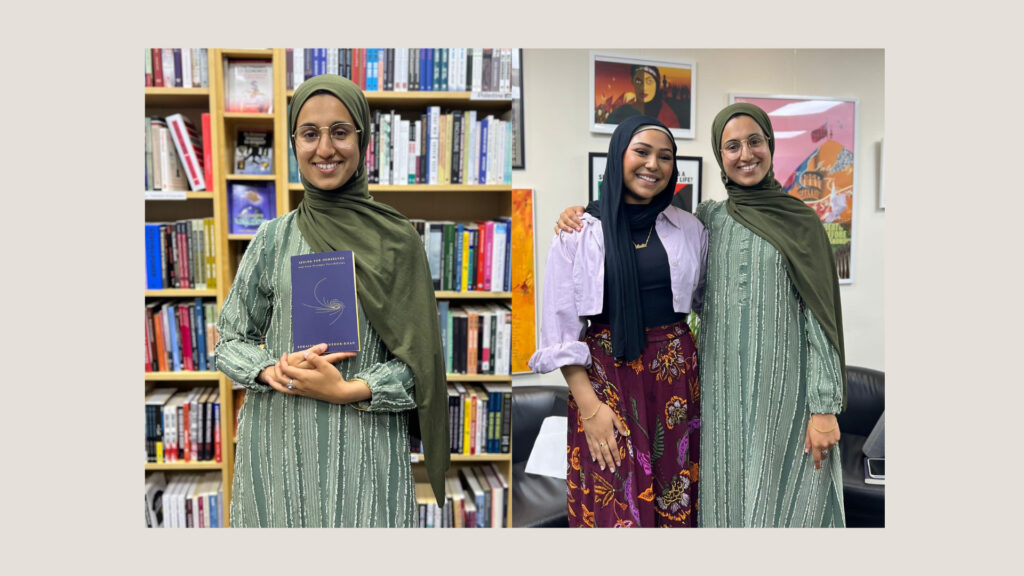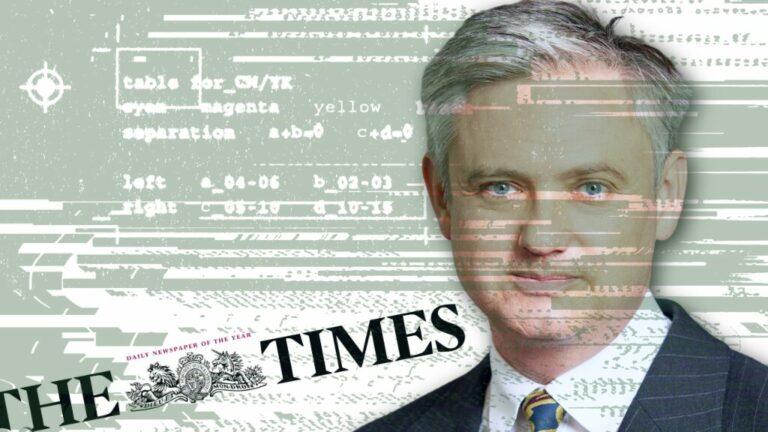IHRC were pleased to welcome back Suhaiymah Manzoor-Khan for author evening, to discuss her most recent publication, Seeing for Ourselves (purchase here from the IHRC Bookshop). This event was chaired by SOAS student, Anika Wadood.
WATCH THE AUTHOR EVENING:
The transcript below has been edited for better readability.
Anika commenced the conversation with the question, “what are your top tips for starting a journal?”
Suhaiymah: it is interesting you have chosen to start with this question because I think that I have always considered what I write in my journals very personal, the interior version of my writing that I would never share. It is also quite dull I think, and not necessarily political and I always feel that what I write to be shared must reveal the political elements… For me writing has always been a way to express myself. I am not very good at knowing how I feel unless I write about it. Many writers have said the same thing, but for me I think it is about survival… I have been in London for 3 days [now] and I have not had the time to write and [I am] struggling mentally. It is a form of expressing myself and finding my interior world, otherwise I feel quite estranged from myself. I think that is important, Islamically as well, [that] we don’t end up estranged from ourselves. We live in a time where we are asked continuously to become estranged from our interior, and at the same time, we should not be so in the interior that we are depoliticised.
Some of the reason behind writing is to find what the truth is rather than assuming what the truth is. Journaling can have a very powerful purpose; even when we journal we have a responsibility to ourselves in that we are not simply serving this goal of wallowing, for example, but to make meaning out of what happens and to understand that nothing is meaningless. Everything that happens is curated by Allah, finely tuned for you. So, sometimes the purpose of journaling is simply that.
In light of the current genocide in Gaza, Anika asked, “h ow would you go about altering the Eurocentric colonial narratives of Palestine to show their truth and be truly seen and how we see the people of Palestine, in contrast to how the West and western media sees them?”
Suhaiymah: something I have been thinking about a lot, sometimes seeing and witnessing someone is the weakest form of faith. We have that hadith about the hand, the tongue, and the heart, and I think that sometimes the last thing that stands between someone being dehumanised is just witnessing them and catching their eye. You see that a lot right now, the witnessing is rubbish, it is nothing but it is something and perhaps it is a way of building an archive which I talk about as a type of sight historically. I am also really interested by what I think weaves throughout this book, is how do we also remove ourselves from the secular imaginary that we are so wrought and entangled in. Many people can mobilise what is happening in Palestine and think about strategies, but I am also interested in the fact that Palestinian people are using the language of Islam, their language is Allahu Akbar, their language is tawakkul (trusting in and relying on God’s plan). So, what does it mean if solidarity is not able to see that epistemology, not able to see that reality? There is a separation; the idea of the political strategy and the supplications and recitations. What truly seeing the oppressed in a situation like this would be to see their knowledge is the reality, their reality is THE reality.
There was a dua circulating on social media, written by a Moroccan scholar during the French occupation; French colonial forces had banned this dua because it was so popular and read so profusely. What does it mean for a colonial power that refuses to acknowledge the reality of your epistemology, to also be so aware that it is powerful enough that is it somehow threatening?
The reason I bring this up is because there is a threat associated with this reality, but at the same time we refuse to even see that reality as real. We see this throughout ourselves… for example, a woman having her hijab ripped off; we fight for the right that that be seen as a genuine violation, a sexual violation, but also it is a spiritual violation. Our reality as people who experience Islamophobia, that is a violence that remains unseen. To answer the question on Palestine, part of the seeing that we are trying to do, is not just witnessing the violence, because witnessing the violence is not enough. The question I ask in the book, Allah says it is not the eyes that are blind, but the hearts. What does it mean to see with our hearts?
Anika: You use acts and scripts at the start of each chapter, it was a story in itself. What was your inspiration behind the scripts?
Suhaiymah: I have these short scenes (at the beginning of every chapter) which initially begin as a conversation between the writer and the book, and then it turns into a conversation between the book, the heart, the soul, the eyes, the mind… In many just charting the spiral of questions I was asking myself around why write a book and what is the message of the book.
Hajar Press really allow flexibility of mixing genres. Another question in the book is around performance; how much are we performing and being, and is there a difference? It was a play on a performance between myself/internal dialogue and presenting it on a page as a somewhat sarcastic, somewhat perhaps parody, and also a way of asking the question, where is the line between performing and not performing and how do we trust our interior voices and intentions? I like being able to play with different forms and they express those questions in a clearer way.
Anika: In what ways have your grandparents inspired this book and how did they react to the book when you told them about it?
Suhaiymah: That is a good and humbling question. My grandma was just like, “I don’t get it, why would anybody care about this?” And I think that is really important because one of the things I explore is that maybe the things that matter so much to me, maybe don’t actually matter to them. It is important to ponder on why that is; it speaks to this thing, I am so attached to the historic evidence of their existence because it is about my experience, this is where I came from and this is all I have. Alhamdulilah I am so blessed to have all that I have with my grandparents. Is there a different level of trust there? A different level of recognition that is it has all been witnessed, it is all being witnessed? We do not need to witness it necessarily. I never intended this book to be about my grandparents; the fact that it has seeped in so profusely and unavoidably more speaks to the fact that I don’t think I can see myself for myself. I am only a product of everybody else’s labour, I am only a product of everybody else’s dreams, hopes, duas. There is something very humbling and important in that there is nothing to see, I am not an independent entity, I am purely like one moment in this history of all these other people’s lives. What does it mean to go unseen and to not place so much emphasis on these things?
I did not intend this book to include a lot about grief, my grandparents, love, and friendship. I thought it would be just about double consciousness and how to get away from seeing ourselves as the other, but it had to be about those things because that was the space I feel is much more interesting to explore.
It goes back to making meaning, and we are asked to do that, for example, ‘do they not reflect on themselves? Do they not on the signs?’. What would it mean to give everything significance as a sign from Allah and therefore reflecting on it and making meaning from it. Everything has value, the significant and the insignificant, and whether we can elevate this level of significance that points back to Allah and I certainly do not do that and cannot do that in all cases but when we are able to, it opens up the stranger possibilities.
Other topics Anika, Suhaiymah and the audience discussed include representation as harmful, the history and root causes of Islamophobia, the tawakkul of the people of Palestine, Allah’s gaze, digital writing, Azeezat Johnson, and critical theories.
Suhaiymah closed the event with a short poem from Seeing for Ourselves.







